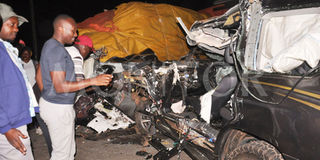Strict traffic enforcement will curb rampant accidents

People react in front of the wreckage of the car in which Kampala billionaire Apollo Nyegamahe, commonly known as Aponye, was traveling at the time of his death on July 6, 2023. PHOTO/PEREZ RUMANZI
What you need to know:
- Whereas measures look good on paper, our appeal is that the law comes into force within a month as guided by the Speaker, and it be enforced to the letter
That Parliament is coming up with a raft of measures to reduce carnage on the roads is sweet music to the ears of Ugandan road users.
This comes just days after businessman Apollo Nyegamehe, aka Aponye, died in a car crash on the Kabale-Mbarara highway on his way to Rukiga District. His car rammed into a stationary truck that was parked on the roadside without any warning signs.
It was the latest of car accidents that have been attributed to stationary cars on highways. On January 6, at least 19 people died and 21 others were injured after a bus rammed into a stationary trailer at Adebe Trading Centre on the Kampala-Gulu highway.
Later that month, two people died and two others were critically injured after a speeding Fort Portal-bound ambulance rammed into a stationary car at night on the Fort Portal-Kasese Highway.
Then early last month, five people were confirmed dead and several others injured in a 4.30am road crash involving a passenger bus and a charcoal truck on the Kampala-Gulu highway.
The move by Speaker of Parliament Anita Among this week to push for measure to reduce carnage on the road caused by stationary cars is a welcomed decision.
In a meeting called by the Speaker and attended by officials from ministry of Works, Uganda National Roads Authority (Unra), police and Health ministry, it was agreed that the Road Act, 2019, be quickly revised to include regulations to put into practice Sections 57, 58 and 59 of the law providing for the towing and auctioning of vehicles that are abandoned on highways.
Subsections 1-3 of Section 58 state that a person whose vehicle breaks down or is involved in an accident on a public road shall remove the vehicle within two hours, and if the breakdown or accident occurs in a rural area, it shall be removed within six hours.
Under the law, motorists are not allowed to repair vehicles on a public road, except for emergency cases where repair work shall not exceed two hours in an urban area, and six hours in rural places.
Whereas measures look good on paper, our appeal is that the law comes into force within a month as guided by the Speaker, and it be enforced to the letter.
Our biggest problem has never been the lack of laws to guide society, but lack of the will to enforce laws. We have a section of Ugandans who believe they are “connected” and, therefore, above the law.
And then rampant corruption that has also permeated traffic law enforcement is also a big threat to the success of the new rules.
Unless these are dealt with decisively, we will continue lamenting the cost of road accidents in Uganda.




